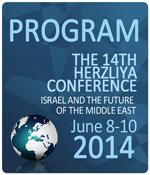'Israel’s national security doctrine needs a serious update'
In 2006, a committee headed by former cabinet minister Dan Meridor recommended adding a fourth concept to Israel’s security concept, that of defense.
A document that Mintz and Shaul Shay, an IDC colleague, will present at the conference proposes the addition of four new components to the security doctrine: prevention and preemption, alliance with the United States, regional alliances and what Mintz and Shay call “adaptation.” Prevention and preemption refer to a policy that Israel has already adopted, using all the means at its disposal in order to preempt threats of non-conventional weapon use against it, from the attacks on the German scientists who were helping Egypt to develop missiles in the 1960s to the 1981 attack on Iraq’s Osirak nuclear reactor and air raids on Syria – never officially acknowledged by Israel, but carried out by Israel according to the U.S. and other countries – including the 2007 attack on a nuclear facility and attacks on arms convoys bound for Hezbollah over the past two years.
The document’s authors emphasize the importance of the special relationship between Israel and the U.S. as a central component of Israel’s security doctrine. They view this relationship as “the most important political and security asset that Israel has in the international sphere.”
This being the case, as they see it, Israel must give priority wherever possible to cultivating this relationship. With regard to the regional alliances, they point to three strategic areas of interest with which Israel should cultivate both formal and informal alliances: the Arab League peace initiative as a base for regional cooperation with Saudi Arabia and the Gulf states; ties with the East African states of Ethiopia, Kenya, South Sudan and Uganda, which have Christian communities; and with the Mediterranean Basin states of Greece, Cyprus and Balkan states.
The idea of the fourth component, adaptation, came about in response to the shake-up in the Arab world. The authors speak of a “butterfly effect” that began with the December 2010 protests in Tunisia and went on to thoroughly upend the regional order. They say the frequent, extreme changes of the past several years demand “the development of an educational mechanism and decision-making tools within a short period of time that will allow for the minimalization of the risks [to Israel].”
Among the figures scheduled to address the conference are President Shimon Peres, Defense Minister Moshe Ya’alon, Israel Defense Forces Chief of Staff Benny Gantz and many experts in security and strategy from Israel and abroad.
Amos Harel

